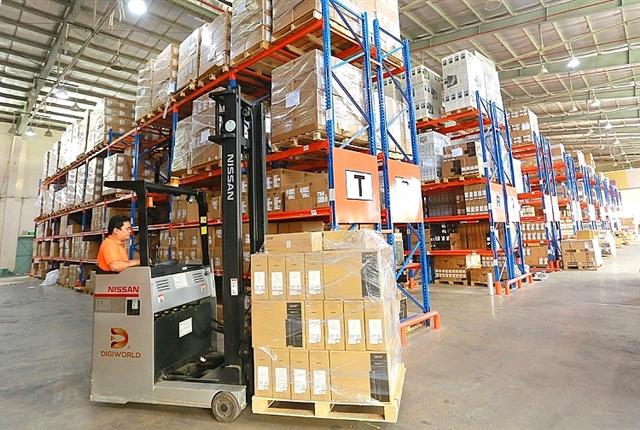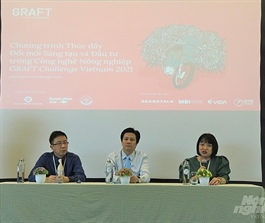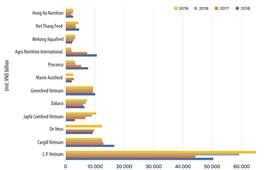Digiworld aims to reach billion-dollar market cap target
Digiworld aims to reach billion-dollar market cap target
After handsets, laptops, and fast-moving consumer goods, privately-held Digiworld – a leading ICT distributor – is looking further afield into home appliances trade on its journey to achieve its billion-dollar market cap target.

Digiworld aims to grow 25 per cent on average annually in the next decade
|
Two months ago, Digiworld’s executive told securities firms that a partner producing and assembling Xiaomi tech products is opening a plant in Vietnam’s northern port city Haiphong, and that the plant would commence operation in the second half of this year.
Albeit the information was not yet confirmed by Digiworld’s leadership at the company’s recent annual general shareholders’ meeting on April 4, the company’s CEO Doan Hong Viet was quoted as saying, “This is informal information; Xiaomi and Digiworld will be making an official announcement on a suitable timing in the future.”
In fact, Digiworld is the exclusive distributor of all Xiaomi products in the Vietnamese market. According to Viet, home appliances would be one of hte key segments of Digiworld by 2024 with the target of holding a "remarkable market share", in which TV sets would secure the largest share in value.
The home appliances market, with teh main items being TV sets, refrigerators, washing machines, ovens, and the like, has been totally untouched by Digiworld until the present. Viet explained that the overly high import duty of about 15 per cent was the reason why Digiworld had yet to engage in importing products for distribution and wholesale in the Vietnamese market.
| At the recent AGM, CEO Viet also lifted the curtain on Digiworld’s intention to venture into other product segments to realise the target of reaching a market cap in the billion-dollar range. |
“If there was a plant assembling Xiaomi products in Vietnam, the tariff barrier would disappear, providing the bedrock for us to break into this up-and-coming segment. This will be the answer for the question how Digiworld would attain an annual growth pace averaging 25 per cent in the upcoming decade,” said Viet.
On the sidelines of Digiworld’s annual general meeting (AGM), Viet said that the company will be making an official foray into the home appliance wholesale market late this year or early next year. Hence, this new segment will make no contributions to the company’s revenue and post-tax profit targets which have been set at VND15.2 trillion ($660.87 million) and VND300 billion ($13 million) for 2021.
“Digiworld is the exclusive distributor of Xiaomi and Huawei products in Vietnam. If we succeed in grabbing about 5-10 per cent market share of the TV market, which is now valued at about VND40 trillion ($1.74 billion), that would be remarkable. For the time being, we are distributing Xiaomi items in this segment,” said Viet.
The Chinese TV market is dominated by Xiaomi. In Vietnam, the TV market belongs to three top players – Samsung, Sony, and LG.
According to figures by the Ministry of Industry and Trade’s Domestic Market Department, the domestic home appliances market is valued at about $12.5-13 billion and the purchasing demand for household electronic items and kitchen devices will remain high at least to 2025.
At the recent AGM, CEO Viet also lifted the curtain on Digiworld’s intention to venture into other product segments to realise the target of reaching a market cap in the billion-dollar range.
Accordingly, mergers and acquisitions (M&A) deals through acquiring firms possessing distribution channels which Digiworld doesn’t have is the tactic helping the company to realise its 25 per cent annual growth target.
Digiworld was also reported to have been working with several consultancy firms and “targeting” several firms for M&A but has yet to reach the stage of “making an announcement”.
Last year, consumer goods fetched Digiworld VND265 billion ($11.5 million), only 2 per cent of the company’s total revenue, fulfilling only 53 per cent of the projection.
The solution for this disappointing performance is “giving priority to finding new products as well as engaging in M&A”.
Digiworld’s putting investment into pawnshop chain Vietmoney is an example. The company has been using Vietmoney’s outlets as a lever to stimulate business activities.
Accordingly, in September 2020, Vietmoney announced wrapping up its Series A funding round from Digiworld Venture and Finnish equity fund Probus Opportunities.
These two partners were reported to co-manage a 30 per cent stake in Vietmoney and have seats at Vietmoney’s Board of Management.
According to Digiworld’s report, the partners have put VND50.5 billion ($2.2 million) to possess a 21.86 per cent stake in Vietmoney.
“To grow into a billion-dollar company, we are seeking growth across the board, from consumer goods to supplementing new brands, customers, and sales channels. We are also constantly searching for new models towards realising the target of shaping a complete consumer ecosystem,” said Nguyen Hai Khoi, Digiworld’s investment director.
Khoi shares that Vietmoney is providing personal financial solutions that could effectively serve Digiworld’s consumer goods segment.
Statistics by fintech firm FiinGroup show that around 48 per cent of the Vietnamese population have low income of below $300 per month, a potential segment for consumer lending firms.
























